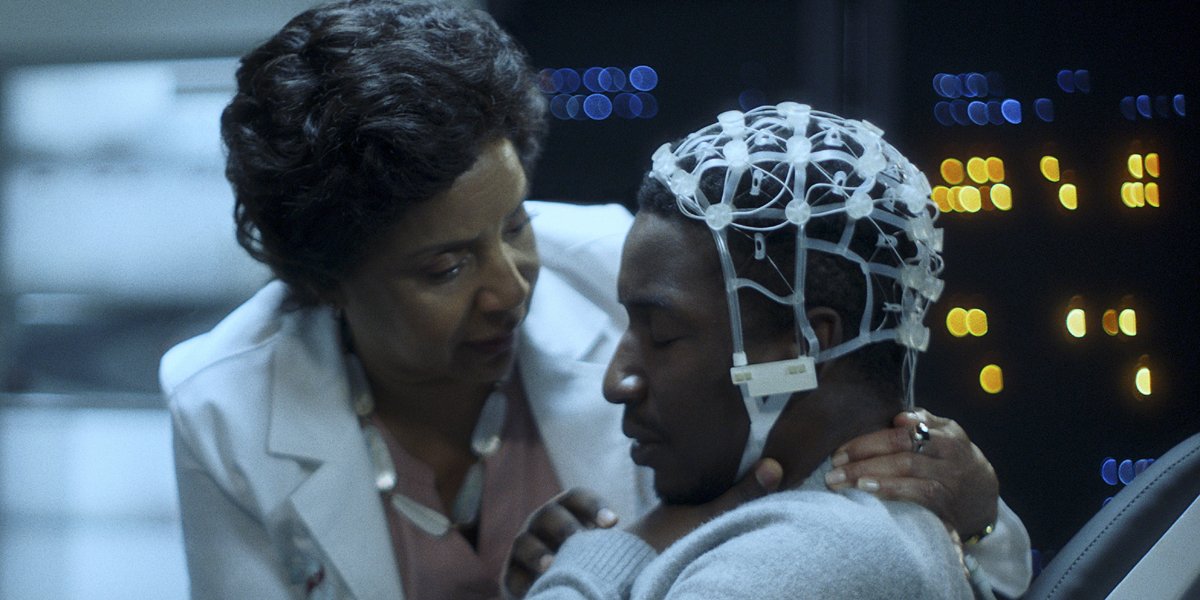Arriving on the scene in 2009 with the blockbuster hit Paranormal Activity, the Blumhouse Productions brand has emerged as one of the industry’s strongest thanks to a relatively simply business strategy. In short, they provide opportunities to (primarily) horror filmmakers to make their visions a reality – but within the constraints of a limited budget that is usually between $3-10 million. The model has produced some fantastic hits, including Jordan Peele’s Get Out, Mike Flanagan’s Oculus, Leigh Whannell’s Upgrade, and Christopher Landon’s Happy Death Day… though those titles also exist on a production record alongside a number of movies that suffer from ideas that don’t feel fully fleshed out, among other issues.
On that quality scale, Emmanuel Osei-Kuffour's Black Box rests comfortably in the middle. Like the best of Blumhouse’s output, it has a fascinating and cool premise at its core (and one that certainly has horror in its veins) but it’s also hampered by seemingly not having the resources for it to grasp its full potential. It’s an entertaining and engaging watch, but also feels like it could have been much more.
The script written by Osei-Koffour and Stephen Herman tells the story of Nolan (Mamoudou Athie), a young man who is a stranger in his own body. The survivor of a car accident that left him a widower and a single father, he suffers from amnesia and struggles every day to remember to do the daily tasks of his previous life. His delightful young daughter Ava (Amanda Christine) does everything in her power to help him, as does his best friend Gary (Tosin Morohunfola), but troubles start to stack when he is laid off from his job as a news photographer – no longer possessing his old “eye” – and he routinely forgets to pick up Ava from school.
Fearing the possibility of everything falling apart because of his short-term memory loss, Nolan agrees to take part in a radical new experimental treatment being performed by Dr. Lillian Brooks (Phylicia Rashad), a neuropsychiatrist at the hospital where Gary works. The therapy uses a device called a Black Box that is best described as a virtual reality visor that allows the user to access their own memories – with the thought being that our protagonist can rebuild his broken brain by being immersed in his own past experiences. It so happens that the procedure isn’t without its consequences, however, as a horrific visage is unlocked in Nolan’s mind along with some terrifying secrets.
At the core of Black Box is a great high-concept idea.
We have seen time and time again that memory can make for great cinematic subject matter, with films like Christopher Nolan’s Memento (directly referenced in the name of the protagonist), Michel Gondry’s Eternal Sunshine Of The Spotless Mind, and Paul Verhoeven’s Total Recall springing to mind, and Emmanuel Osei-Kuffour has added a cool new story to that legacy. Nolan’s journey is both an emotional and engaging one as he is put at the center of a horror story with a unique sci-fi twist, and there are plenty of cool surprises packed in that keep the audience guessing as to where it’s going to go next.
Black Box also has a good deal of untapped potential.
The drawback of Black Box is that its scope is limited and it doesn’t quite get the opportunity to fully explore its great ideas – the standout example being the usage of the titular device in the film. While the Black Box is clearly a remarkable device, it’s not exactly used remarkably. The extent of Nolan’s experiences during his therapy sessions is limited to him starting in a neutral zone (which has the appearance of his daughter’s bedroom) and “reliving” his wedding day and a single domestic conflict with his wife. Within the plot these memories are entirely utilitarian, providing everything the story needs to propel itself, and while that keeps the narrative pace moving briskly, it also makes the whole thing a bit too clean and simple in a film with the potential for more interesting complexity.
It isn’t terribly scary, but Black Box does have moments that will freak you out.
Similar sentiments can be shared about Black Box’s approach as a horror film. There is a very clear approach when it comes to its attempts to generate scares, with a disturbing, broken figure creeping out of the shadows of Nolan’s subconscious whenever he’s in Dr. Brooks’ care. It’s certainly hair-raising and effective, as contortionist Troy James does some phenomenal physical work in the role, but it’s also a relatively simple plot device that has diminishing returns as it’s used frequently throughout the movie. It’s an area in which story gets a bit too far ahead of style, and it leaves you wanting more.
There’s a fair comparison to be made between Black Box and James DeMonaco’s The Purge – another Blumhouse film: both of them have some really smart ideas, but are also clearly contained and scaled down due to limited resources. Of course, the success of the latter film ultimately led to DeMonaco having the opportunity for a sequel, The Purge: Anarchy, which had triple the budget and is vastly superior to its predecessor. Black Box does end in a way that leaves certain doors open, so we’ll just have to wait and see what happens.

Eric Eisenberg is the Assistant Managing Editor at CinemaBlend. After graduating Boston University and earning a bachelor’s degree in journalism, he took a part-time job as a staff writer for CinemaBlend, and after six months was offered the opportunity to move to Los Angeles and take on a newly created West Coast Editor position. Over a decade later, he's continuing to advance his interests and expertise. In addition to conducting filmmaker interviews and contributing to the news and feature content of the site, Eric also oversees the Movie Reviews section, writes the the weekend box office report (published Sundays), and is the site's resident Stephen King expert. He has two King-related columns.











